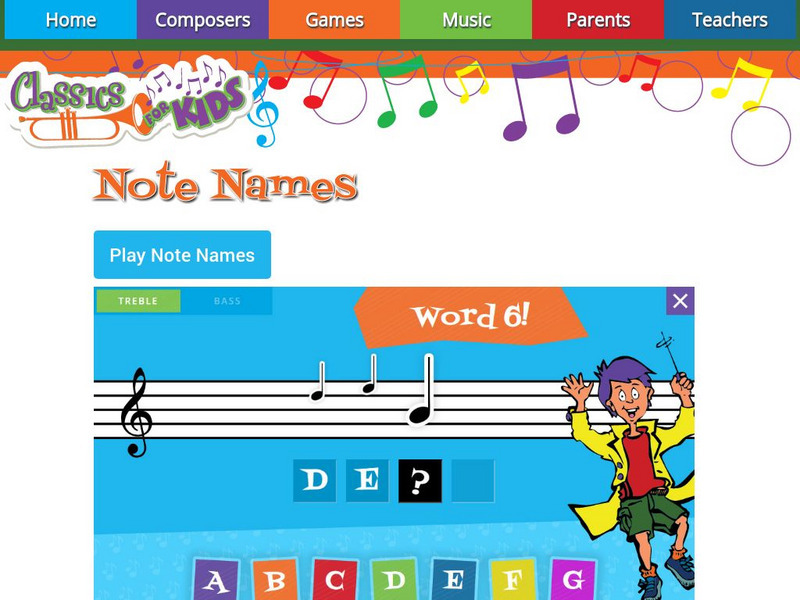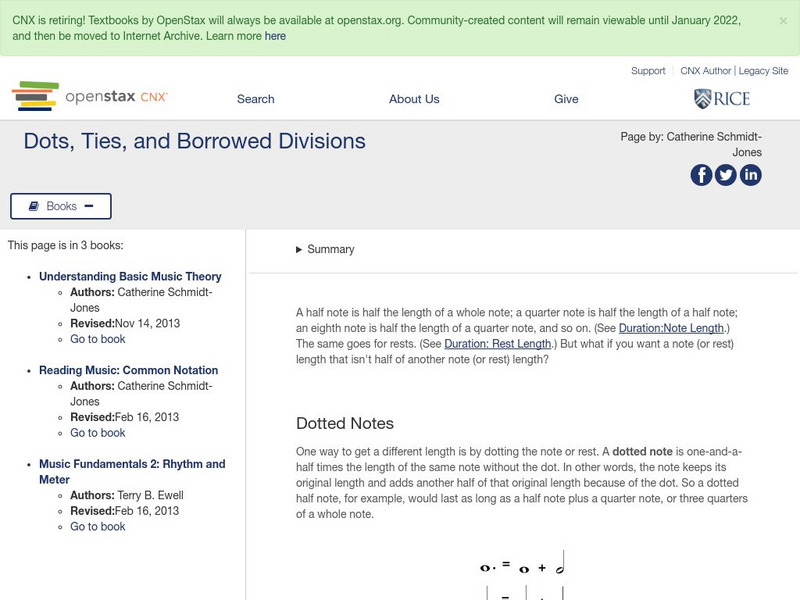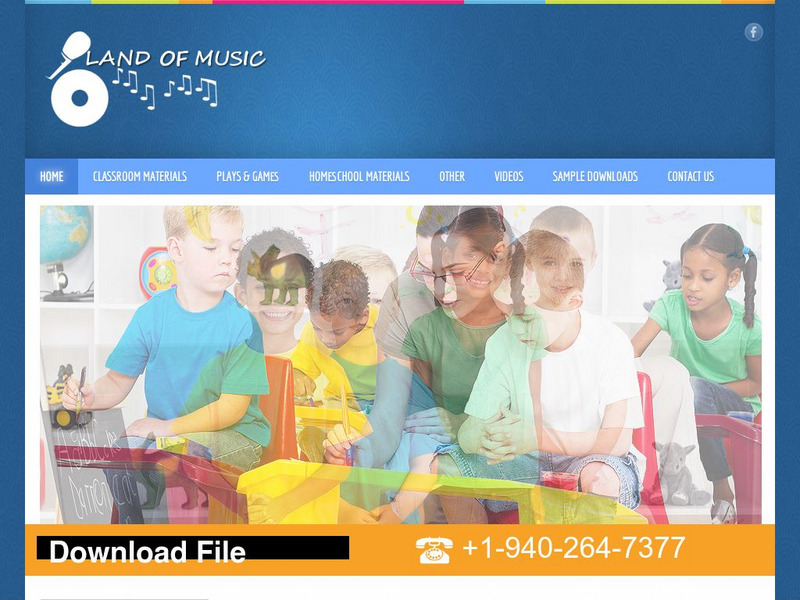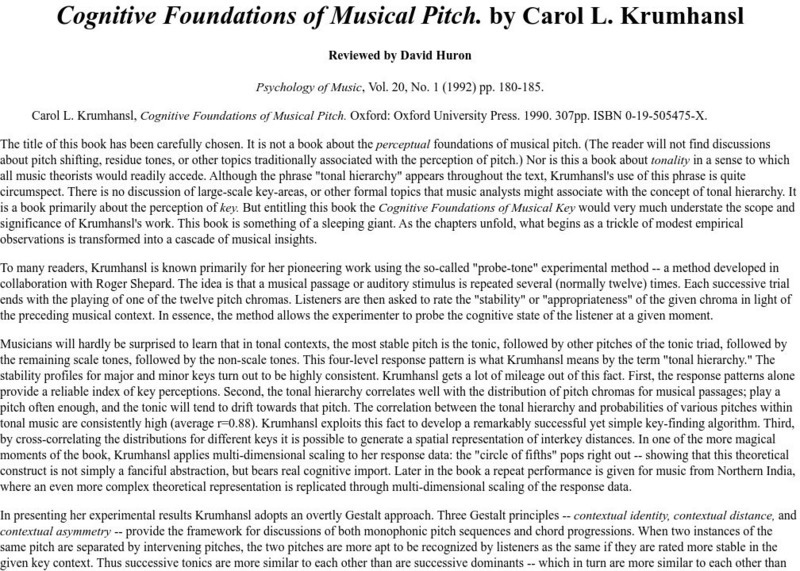Hi, what do you want to do?
ClassFlow
Class Flow: Learning to Reading Musical Notes
[Free Registration/Login Required] In this flipchart students will learn to recognize lines, spaces, and notes on the treble clef staff. It contains interactive pages, 2 hand-bell songs, and a hand-bell video clip.
Alabama Learning Exchange
Alex: Line Notes and Space Notes
This lesson will help students determine whether the notes on a staff appear on a line or on a space. Students also will recognize how many lines and spaces are on a staff.
Music Theory
Music theory.net: Dots and Ties
A terrific resource for beginners! Gives examples of dots and ties, and explains how they are used. Simple illustrations and explanations make this animated site easy to follow. By MusicTheory.net.
ReadWriteThink
Read Write Think: Exploring Reading Strategies
This lesson plan explores reading strategies by creating a musical soundtrack to accompany the specific reading. Included in the lesson plan is an overview, practice, objectives, resources, preparation, and more.
Read Works
Read Works: Program Notes Rhapsody in Blue
[Free Registration/Login Required] This PDF is the Program Notes from The New York Philharmonic's production of "Rhapsody in Blue" by George Gershwin. It provides information about Gershwin and his writing of the "jazz concerto." It is...
Smithsonian Institution
Smithsonian: Shape Note Singing [Pdf]
An essay and lesson plan on traditional American shape-note choral singing.
Other
Music Theory First Aid for Struggling Students
This site provides music theory information on such topics as rhythm, intervals, scales, chords, etc. Also, there is a fine section which describes the basic concepts of form and structure.
Music Theory
Music theory.net
An online beginning music theory and ear training site. This site is for students to use at home to reinforce what they learn in class.
Other
Tone Savvy: E Music Theory
This site provides good online learning games and exercises for music theory. It also has a lot of options for teachers if they choose to subscribe.
Other
Piano Music Sight Reading Practice
Actually this clever site drills pianists on note names and note placement on the keyboard. Kids can access this site at home for practice. Both treble and bass clef are used.
Music Education
Learning to Read Music: Clefs
Younger musicians and music-appreciation students can learn the notes of the treble clef and bass clef.
University of Kentucky
The Physics and Math of Music
Read about a math research project done by three college students which helps us see physics and math in music. Here's a great approach for integrating curriculum!
PBS
Classics for Kids: Note Name Game
Have fun playing this interactive game that helps you practice your knowledge of note names. Drag and drop the names of the notes to spell words.
OpenStax
Open Stax: Catherine Schmidt Jones: Dots, Ties, and Borrowed Divisions
Read and learn about how dotted notes and ties work. Included on this page is a self checking quiz.
Other
Visual Jazz Publications
This company produces educational materials to help you succeed in jazz improvisation and sight reading. Of note on their site is "The Art of Improvisation," a free download that guides you through the improvisational process.
Other
The Land of Music: Homepage
Principally an e-commerce site, although free sample lessons and music clips are available from this award-winning provider of music education tools. The Land of Music teaches how to read, write, and enjoy music through songs, stories,...
Curated OER
Learning to Read Music: Clefs
Younger musicians and music-appreciation students can learn the notes of the treble clef and bass clef.
Curated OER
Learning to Read Music: Clefs
Younger musicians and music-appreciation students can learn the notes of the treble clef and bass clef.
Travel Document Systems
Tds: Azerbaijan: Culture
The culture of Azerbaijan is a blend of Islamic and European traditions. Read about the country's music, literature, architecture, and textiles from this information from the U.S. State Dept. Background Notes.
Ohio State University
Huron's Review of C. Krumhansl's Cognitive Foundations
This book review clearly states in the first paragraph what is not included as part of the text. The book centers its content around the "perception of key." The author is known for her "probe-tone" method, which is defined. For a book...
Phil Tulga
Phil Tulga: Counting Music: How Music Is Counted and Measured
This fun interactive counting activity is great for students to create their own rhythms. Students can use 4/4, 3/4 or 2/4 meters to input and listen to their own rhythms instantly.
Other
Ruby Cliff Computing: Learn Guitar Theory With Virtualoso Guitar
This is a fantastic site that teaches basic music reading, especially as related to the guitar. Although the site is a promotional software site, the trial version is excellent by itself.
Other
Mml: Notation Module: Clef
Although very simple in its design, this short piece gives a nice overview of musical terms, one of which is the treble clef. The author briefly discusses the attribute of "key" in conjunction with the clef.
PBS
Pbs: American Masters: Leonard Bernstein
A brief biography of American composer Leonard Bernstein is presented here. Read the highlights of his career and contributions to music.









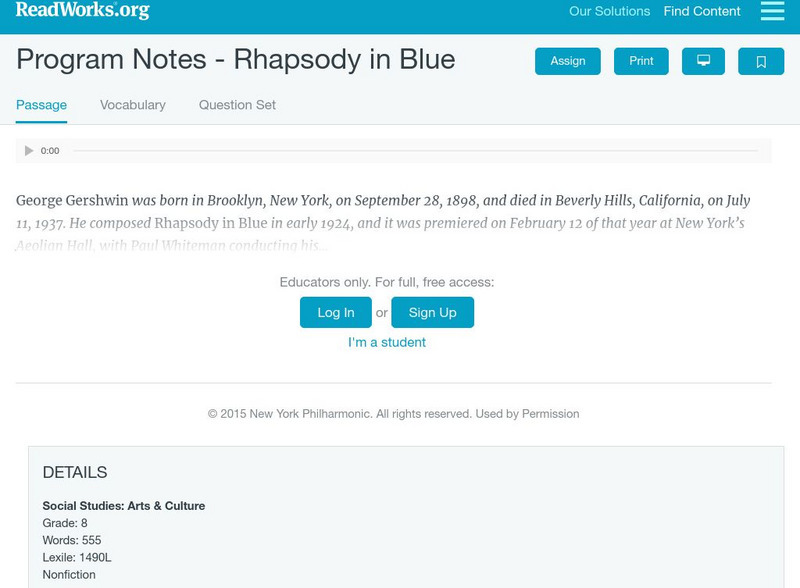
![Smithsonian: Shape Note Singing [Pdf] Lesson Plan Smithsonian: Shape Note Singing [Pdf] Lesson Plan](https://static.lp.lexp.cloud/images/attachment_defaults/resource/large/FPO-knovation.png)




